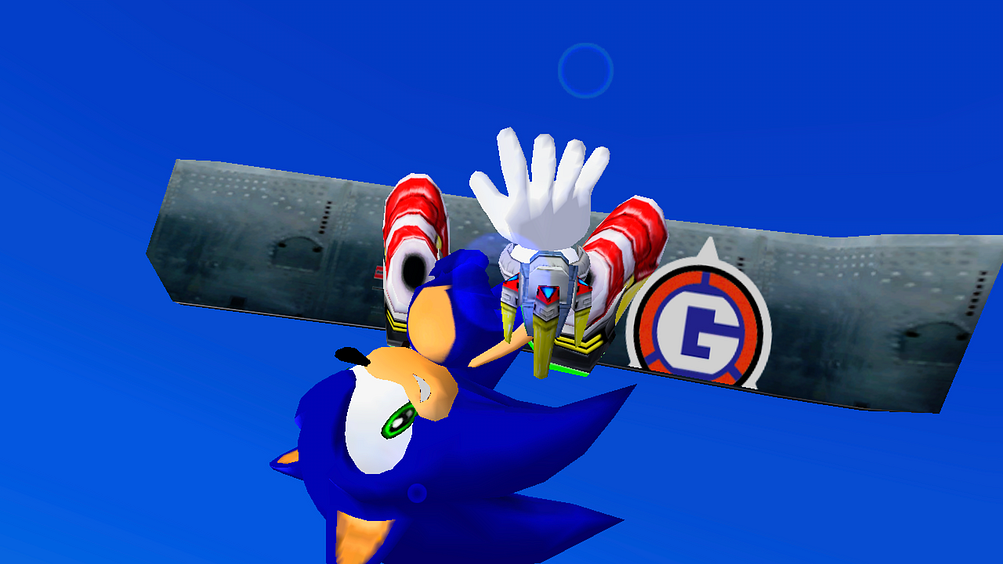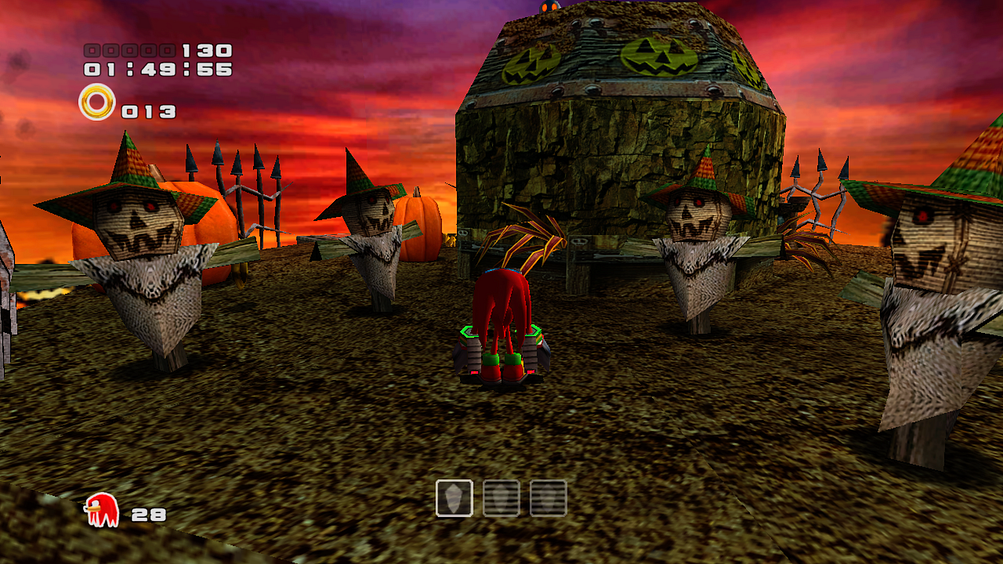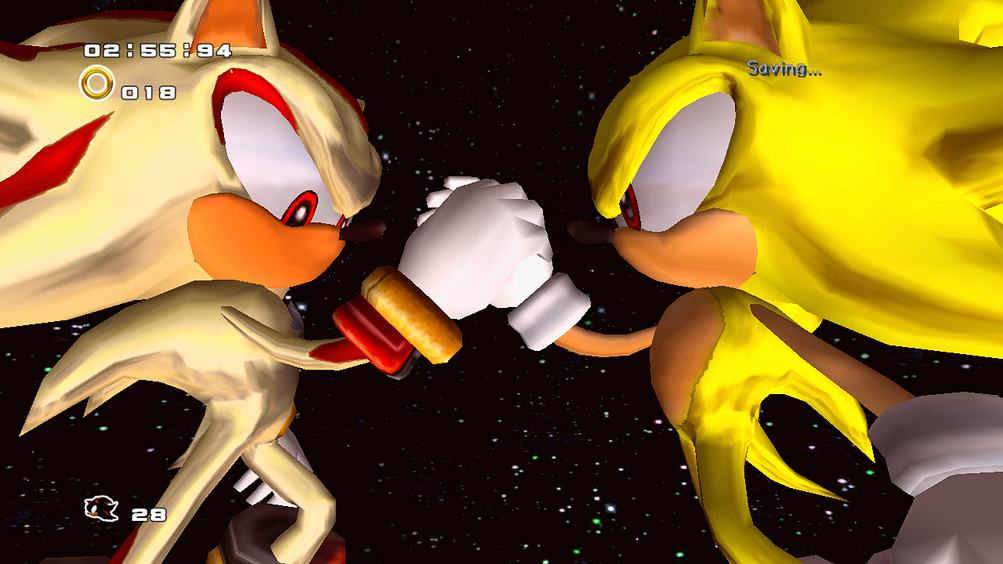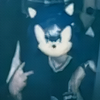How Sonic Adventure 2 Saved My Life
What Sonic means to players with ADHD

There is a tunnel at the speed of sound where 16-year-old me could always hide. Any time between twelve and four in the morning on the weekends, I’d crawl into my family’s used Honda Civic, often with my two younger siblings in tow, and just start driving. No destination in mind. Just the motion, and our little fortress in time: a sanctuary that we could only find while zipping down the stardust speedway of Route 9 in Central Massachusetts. On my worst days, I breathe in and imagine myself there again, lost in the blue blur of xenon-gas headlights weaving between lanes.

Shiro Maekawa, the lead scenario writer on Sonic Adventure 2, once said that he feels “a deeper connection to [Shadow] than [his] real family… he can’t think of Shadow as a separate person” (though he acknowledges he cannot perform Chaos Control). Growing up with parents who were “not ready for an ADHD kid”, I came to feel the same way about Sonic. Playing SA2 on my older cousin’s Dreamcast around the tender age of 10 was the first time I saw myself represented so clearly in a video game. Sonic the Hedgehog was and remains a devil-may-care, free-spirited wanderer who happens upon heroism in all the wrong places. He’s loud, ambitious, can’t stand still. He’s never afraid to stand out and make a statement. The best part? He’s cool for living by his own rules. Anyone who tries to punish him for being himself never wins.
When you have ADHD and impatient parents, you live day to day trying to avoid consequences. It’s not easy — taking up as little space as possible is tough when you’re genetically predisposed to being noisy, restless, and failing to understand the nuance of words like “maybe” or “possibly” or “please do not chase pigeons into oncoming traffic”. Life is a kaleidoscope of vague instructions, glittering with distraction and intrigue in all the wrong corners of my brain.
Any attempts I made to blend in were doomed from the outset. In preschool, I once released all of the animals in our backyard petting zoo like they were Flickies trapped in a Robotnik mechanism. In third grade, I took it upon myself to find “the culprit” who was throwing paper towels onto bathroom floors at school after a short assembly about the issue. In fifth grade, I wrote an essay championing bisexual Queen singer Freddie Mercury’s legacy in direct defiance of a homophobic substitute teacher. My track record of incidents carried me well into high school, some less memorable than others. Whether I remember them or not, though, I don’t regret them — lashing out at school may well have been the only time I could express myself.

Being at home was another story. I began to internalize the things I heard all too often there, believing I would amount to nothing if I didn’t “try harder” and “get my shit together”. My every action was subject to constant scrutiny. That kind of pressure would weigh heavily on any kid, let alone one with mental health needs.
Video games, however, were something my parents had little interest in, aside from restricting how much time I could spend playing them (often unsuccessfully; I had a worm light, a Game Boy Advance, and a thick comforter to hide in). Playing them became a hobby and part of my identity that I could negotiate entirely on my own terms, and Sonic was instrumental in forming that identity as both a player and a human being.
Playing Sonic Adventure 2 was the only time when none of the rules applied; he allowed me to be my most authentic self in a world that otherwise cracked down on me for it. He was always on the go, made jokes when it wasn’t necessarily smart or appropriate, loved goofing around, and somehow always managed to make it to the next stage, no matter what that may be. As a kid growing up in a household where my every move was subject to harsh criticism, violence, or both, playing a character like me was the most valuable comfort anything could provide.
The last time I ran away from home, I was around 23. It was a rainy night. I was visiting after two years away at college, and my parents boxed my car into their driveway. One whispered phone call and an hour later, I sprinted from the front door of the house with my belongings, puddles splashing on my heels until I hit the back seat of a well-loved silver sedan. My college roommate and her father were waiting there to whisk me away. We sped off across the dark pavement, and I watched red and yellow lights dance past us through the window. It was no Radical Highway, but for now, it was freedom. I haven’t lived with my parents since.
I’m no longer a bright-eyed fifth-grader playing kickball with the boys to prove a point (nor am I a girl with a point to prove, either). I’m a 27-year-old college dropout estranged from my immediate and extended family on both sides. My body isn’t as strong or boundlessly energetic as it used to be; I’m not built for somersaulting under G.U.N. equipment or doing midair flips on torn-off helicopter panels. I’m more of a Big the Cat than a Sonic the Hedgehog right now, and I don’t even know how to spot a frog in the middle of a forest, let alone how to fish. Being a kid with ADHD is one thing — being an adult struggling to hold employment and navigate a world built for people with executive function is another. My childhood didn’t prepare me for the eventuality that my ADHD would stick around.
But Sonic Adventure 2 has never left me, no matter how high or low my expectations for myself. When I sprint for the bus stop to catch the 42 to my community college, the wind sweeps through me like a perfect homing attack combo in Metal Harbor — I breathe in and I’m there between silver missile shells, catching the sea breeze as I fly through the air. When summer carries gold pollen through the lush, rural farmlands, I remember racing that blinking yellow timer through Green Forest, thumb at full tilt on the analog stick. Every Halloween, I brag to all my friends that I have the lyrics to A Ghost’s Pumpkin Soup…for Pumpkin Hill memorized. Depending upon the audience and the number of hard ciders in my bloodstream, I just might force everyone to suffer the entire rap.

HowLongToBeat says that the average player would take 17½ hours to complete the main story and extras in Sonic Adventure 2. A completionist, roughly 44½ — in the summer after my college roommate’s family took me in, I revisited the game during a long depressive episode to get all 180 Emblems, a feat I had never accomplished in my childhood. That 44½ estimate feels accurate, but also couldn’t be farther from the truth; for all the hours I put into SA2, it has put hundreds more into me. The game was there for me every time I ran away from home, every time I lost a friend over a miscommunication, every time I royally wanged a deadline, every time I was late to catch a bus, every time I wondered if I’d make it through another night alone. It was there when I scored that last A rank and the corresponding Emblem in Mad Space, the stage I’d put off as long as I could. It will be there whenever I finally finish my Communications degree and be there in the spirit of anything I write throughout my budding career.
Sonic’s strongest asset is his freedom. In spite of everything, I still have mine. It’s relative, but nothing has managed to take it from me yet; no Finalhazard in my life has really been the end. Maybe I’m not a rich and famous game writer just yet (if such a thing exists). Maybe I’m still recovering from the years I spent being punished for who I am. Maybe the best years of my life are still ahead of me, however far. I don’t plan to slow down or throw in the towel just yet. It doesn’t matter now what happens — I will never give up the fight.
People change the world in many ways, large and small; for now, I’m using the power of words in hopes that even one person might feel less alone hearing my story. Talking about my experiences with ADHD encourages me and others to be more open about the particularities of our wild brains, and to be proud of them where we can.

Without Sonic and friends, I would have had no hope for a future beyond the reach of my parents. Millions of kids around the world feel the same way each day: that there is no world outside of the one they know.
To myself and to them, I repeat the truth that Crush 40’s rock ballad “Live & Learn” taught me: hold onto “what if”.
